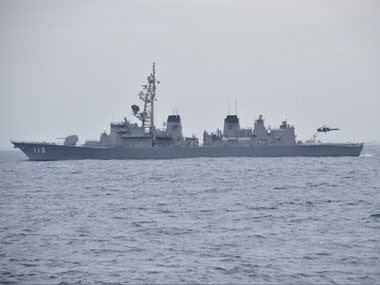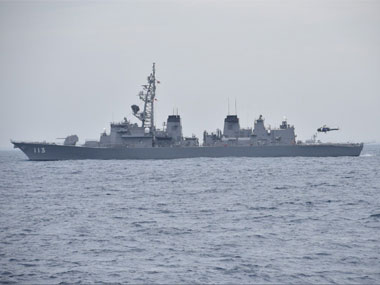Recent reports in the The Hindu quoting an unnamed defence source raised the possibility that Australia will once again be barred from the annual Malabar naval exercises held between the US, Japan and India. The exercises are usually scheduled for mid-year, and are directed towards some specific core tasks. In 2017, it was targeted at anti-submarine operations, which happened to coincide with increased sightings of Chinese submarines in the Indian Ocean. The 2018 iteration was held off Guam in the Philippines Sea for the first time, and also included the Nimitz class US aircraft carrier the USS Ronald Reagan, and its accompanying fleet while Japan sent a helicopter carrier and destroyers. That exercise was focussed on maritime patrol and reconnaissance operations, surface and anti-submarine warfare, according to the US Navy bulletin. Australia was not invited then either. [caption id=“attachment_3816399” align=“alignleft” width=“380”]  Representational image. Indian Navy[/caption] Media reports both from India and earlier from Australia tended to focus on Indian weak knees under supposed Chinese pressure, as the main reason why New Delhi refused to expand the exercise to include Australia. According to these commentators, that would have seemed much too much like an exercise by the “Quad” — the grouping revived in 2017 after a long hiatus — which comprises Japan, India, the US and Australia. There is no doubt that China has pronounced reservations on this coming together of four powers, which is unsurprising. At the time of its formation, commentators prone to large speculations had wondered whether this heralded the beginning of a new Indo-Pacific NATO. It did not, primarily because it was never intended to be anything of the sort, and certainly not in New Delhi. Why the Quad is seen in the same bracket as the Malabar exercises remains a mystery. India has its own sets of military or maritime exercises with different countries originating usually from a ‘strategic’ agreement signed at different times. Thus the Malabar exercises started in 1992, and Japan joined in 2015. Japan and the US have their own sets of exercises under different heads, bilaterally and including through NATO and separately the prestigious exercise RIMPAC where India is an observer. India and Australia have a separate AUSINDEX a biennale event — which was held last September — first started in 2015. The exercise ‘Indo-Pacific Endeavour 2019’ with the Australian Defence Forces is due to take off soon. India holds exercises with more than 14 countries, with each tailored to the needs of that particular relationship or capability. For instance, an exercise with Thailand is focussed on coordinated patrolling while one with Association of Southeast Asian Nations (ASEAN) is on combating terrorism. The Quad on the other hand is a diplomatic exercise which as Tanvi Madan writes, began originally with a disaster management through a Tsunami Core Group in 2004-05 with the four countries participating as an ad hoc response team. Subsequently, it was primarily Japan’s Shinzo Abe who pushed an idea of a concert of democracies, a ‘security diamond’ and so on. Then prime minister Manmohan Singh also showed interest, but the idea died a more or less natural death. India-Australia relations have, however, progressed by leaps and bounds. Following a civil nuclear deal, Australian uranium arrived in India in 2017, marking a huge breakthrough in relations. As Madan point out, Australia is one of the few countries with whom there is a 2+2 dialogue format: though this is at secretaries-level rather than at the ministerial-level as with the US and Japan. That in itself marks an important difference. India’s relations with Australia or with other important countries are simply at different speeds. For instance, Australia ranks 22 in the list of export destinations while the US is the second. The US and India are dialogue partners on a range of issues, from culture to space. There are far fewer such platforms with Australia. There are important initiatives in the pipeline to ramp up trade and investment through the Australia India Comprehensive Economic Cooperation Agreement. However, Australian interest seems to rise and fall rather rapidly. A landmark report on the potential for India-Australia trade by former High Commissioner to India Peter Verghese, which presented India as a natural ally of Australia and built up the Quad was rather more than quietly launched without any fanfare by the Turnbull government in July. Nothing has been heard of it thereafter. The Australia-India relationship may get there sooner than later, but it’s not on a par with Japan or the US. Meanwhile, a public data base from a department of the Australian National University marks a Chinese investment of more than $40 billion over 2014-2017. Another statistic is interesting. Australian news sources reported that thirty percent of international students in Australia bring in about $10 billion to the economy, a third of total income. Those are just two statistics, but they tell their own story. The point here is not to justify the exclusion of Australia, but to emphasise that India’s Malabar exercises not only predate the Quad by decades, but are part of a naval segment, not a diplomatic one. To conflate the two as media editorials have done is to miss the point entirely. India and Australia have their own bilateral and multilateral paths of diplomacy which sometimes overlap, as in an Australia-Japan- India trilateral, which are often far more important in terms of a deliverable than a naval exercise. Moreover, it is as well to remember that India’s pattern of diplomatic activity shows a reluctance to sidle up to either trade blocks or security clubs. Sitting astride an increasingly important Indo-Pacific, that is likely to be the preferred path for which ever government comes to power. Safety doesn’t always lie in numbers, especially when one is reluctant to roundly label anyone as the enemy or the ‘other’. Until that happens it’s better not to stir the waters.
The point is not to justify the exclusion of Australia, but to emphasise that India’s Malabar exercises not only predate the Quad by decades, but are part of a naval segment, not a diplomatic one
Advertisement
End of Article


)

)
)
)
)
)
)
)
)



